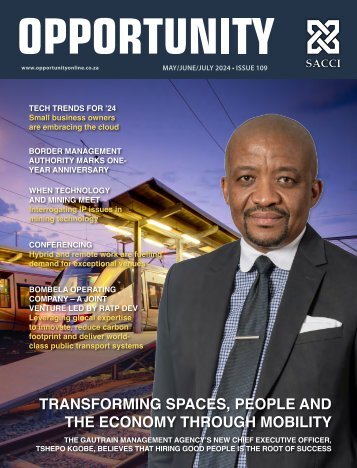South African Business 2016 edition
- Text
- Investment
- Government
- Business
- Development
- Network
- Sectors
- Investing
- Business
- Africa
- African
- Economic
- Manufacturing
- Mining
- Opportunities
- Economy
- Overview
OVERVIEW Regional
OVERVIEW Regional overview: Gauteng Gauteng is the smallest in area but the largest contributor to the national GDP. As the leader of South Africa’s economy, it is the core of South African business and continues to perform in various other sectors. Manufacturing, wholesale, retail and trade, finance and business services and transport are the main economic sectors responsible for Gauteng’s wealth. With a gross domestic product (GDP) valued at R811-billion (US2-billion), Gauteng generates 33.9% of South Africa’s GDP and an astonishing 10% of the total GDP of the entire African continent Key sectors Most of the major banks are positioned around Johannesburg (which is home to Africa’s largest stock exchange, the JSE), and the finance and business services sector is a key focus in the provincial economy. Many international corporates such as Citibank, Microsoft and McDonald’s are headquartered in the province, as it is seen as the commerce capital and the gateway to Africa. Media services in Gauteng are extensive. South Africa’s national broadcaster is based there, as are many popular radio stations and large publishing houses. Gauteng has a highly competitive newspaper market which includes local and national publications such as The Sunday Times, The Sowetan, The Star, Rapport and also the Mail & Guardian. SOUTH AFRICAN BUSINESS 2016 164
Gauteng sector contribution. SOURCE: GAUTENG GROWTH AND DEVELOPMENT AGENCY GENERAL GOVERNMENT SERVICES 19.3% PERSONAL SERVICES 4.4% FINANCE, REAL ESTATE & BUSINESS SERVICES 24.7% TRANSPORT, STORAGE & COMMUNICATION 8.2% WHOLESALE, RETAIL, MOTOR TRADE, CATERING & ACCOMMODATION 15% CONSTRUCTION 4.9% ELECTRICITY, GAS & WATER 2.8% MANUFACTURING 17.1% MINING & QUARRYING 3.2% AGRICULTURE, FORESTRY & FISHING 0.4% OVERVIEW Gauteng has a varied manufacturing sector; from heavy-steel, automotive assembly to the food and beverages industry as well as light commercial and industrial activity. Key food and beverage brands are in operation around Gauteng. Nestlé and Pioneer Foods have spent millions on new developments and improvements. Rainbow, one the country’s leaders in poultry production, has 18 farms and two feed mills in the province. South African Breweries (SAB) has recently constructed a new plant producing malted barley in Alrode to the value of R700- million. Companies such as Kimberly-Clark, Proctor & Gamble, ArcelorMittal, Transnet Engineering and Aspen all have manufacturing facilities in Gauteng Province. Economic future Gauteng is the heart of South Africa – all major roads and highways lead to it. Its infrastructure and transport has always been a focus. In line with ‘Gauteng Vision 2055’, there are big plans for infrastructure. Gauteng dominates the South African economy in every major sector except agriculture, mining and quarrying. Ironically, even with 97% of its land urbanised, the province’s agricultural output, beats that of the rural Eastern Cape, which is 10 times its size. An estimated 40.6% of South Africa’s manufacturing is done here, a third of its electricity, gas and water output, 41.9% of the country’s construction, 39.7% of its finance, real estate and business activity, 34.8% of its wholesale, retail, motor trade and accommodation, 32% of transport, storage and communication, and 38.8% of general governments services. The Gauteng economy itself is dominated by tertiary industries. The finance, real estate and business services sector makes up 22.8% of the province’s gross domestic product, with manufacturing contributing 16.5%, government services 16.3%, and the wholesale, retail, motor trade and accommodation sector 12.6%. Gauteng is embarking on major new infrastructure developments that are set to revolutionise the province and play a major role in positioning the province as the economic heart of the African continent. GAUTENG www.gautengonline.gov.za Capital Population Area Premier Johannesburg 13 200 300 (2015) 18,178 km 2 David Makhura (ANC) Languages Afrikaans, isiZulu, English, Sesotho 165 SOUTH AFRICAN BUSINESS 2016
- Page 1:
SOUTH AFRICAN BUSINESS 2016 EDITION
- Page 6:
CONTENTS Introduction CONTENTS Sout
- Page 10 and 11:
CREDITS Publisher Chris Whales Publ
- Page 12 and 13:
SPECIAL FEATURE South Africa A peri
- Page 14 and 15:
SPECIAL FEATURE In a year that saw
- Page 16 and 17:
SPECIAL FEATURE owes its existence
- Page 18 and 19:
SPECIAL FEATURE against water losse
- Page 20 and 21:
SPECIAL FEATURE Operation Phakisa h
- Page 22 and 23:
SPECIAL FEATURE late in 2014. The h
- Page 24 and 25:
SPECIAL FEATURE Understanding Afric
- Page 26 and 27:
INTERVIEW Job creation on track Ala
- Page 28 and 29:
SPECIAL FEATURE Business funding Th
- Page 30 and 31:
SPECIAL FEATURE in turn makes it ve
- Page 32 and 33:
SPECIAL FEATURE Contact: 012 394 18
- Page 34 and 35:
SPECIAL FEATURE Black Business Supp
- Page 36 and 37:
SPECIAL FEATURE The evolution of sk
- Page 38:
SPECIAL FEATURE providing TVET lear
- Page 42:
PROFILE FP&M Seta Facilitating and
- Page 45 and 46:
• The development of a national s
- Page 48 and 49:
FOCUS Champions of change Five dyna
- Page 50 and 51:
SPECIAL FEATURE The top law firms S
- Page 52 and 53:
SPECIAL FEATURE Keeping the BRICS t
- Page 54 and 55:
SPECIAL FEATURE Keeping BEPS in che
- Page 56 and 57:
SPECIAL FEATURE IPAP in action In 2
- Page 58 and 59:
FOCUS THERE’S NO END TO THE BENEF
- Page 60 and 61:
INTERVIEW The riches of Africa awai
- Page 62 and 63:
INTERVIEW and it could actually be
- Page 64 and 65:
PROFILE ECIC exco profiles Profiles
- Page 66 and 67:
INTERVIEW The hub of Africa Tim Har
- Page 69 and 70:
Key sectors Overview of the main ec
- Page 71 and 72:
OVERVIEW from the subsistence farme
- Page 73 and 74:
OVERVIEW South Africa produces abou
- Page 75 and 76:
South Africa’s looming energy gap
- Page 77 and 78:
How will these resources be develop
- Page 79 and 80:
Vall exclusive economic zone limits
- Page 82 and 83:
OVERVIEW NEED PIC Mining The South
- Page 84 and 85:
OVERVIEW Mineral beneficiation The
- Page 86 and 87:
PROFILE The Council for Geoscience
- Page 88 and 89:
OVERVIEW Energy The South African e
- Page 90 and 91:
INTERVIEW Cummins South Africa Cumm
- Page 92 and 93:
OVERVIEW Manufacturing Increasing m
- Page 94 and 95:
OVERVIEW Automotive International i
- Page 96 and 97:
OVERVIEW Automotive components Incu
- Page 98 and 99:
OVERVIEW Chemicals and pharmaceutic
- Page 100 and 101:
OVERVIEW Healthcare South Africa’
- Page 102 and 103:
OVERVIEW Water Severe water restric
- Page 104:
OVERVIEW Improving quality The intr
- Page 107 and 108:
Our Vision is is “Quality water f
- Page 109 and 110:
OVERVIEW 107 SOUTH AFRICAN BUSINESS
- Page 111 and 112:
OVERVIEW airports in India and Braz
- Page 113 and 114:
affords, while maintaining its envi
- Page 115 and 116: kets, except Australia. In Africa,
- Page 117 and 118: Rosebank, Johannesburg, renamed ‘
- Page 119 and 120: Trade with Africa Improved infrastr
- Page 121 and 122: FOCUS MTN plugs R1.2-billion into K
- Page 123 and 124: MTN rolls out fibre infrastructure
- Page 125 and 126: OVERVIEW community engagement. The
- Page 127 and 128: PROFILE For BEE Verification and is
- Page 129 and 130: OVERVIEW attracting and retaining c
- Page 131 and 132: OVERVIEW Small business is taken ve
- Page 133 and 134: Franchise Fund—an innovative plat
- Page 135 and 136: educating young people in fields th
- Page 137 and 138: OVERVIEW Management Plan has divert
- Page 139 and 140: hazardous waste is also not being c
- Page 141 and 142: INTERVIEW yourself up as a Tier 1 o
- Page 144 and 145: OVERVIEW Renewable energy South Afr
- Page 146 and 147: INTERVIEW Plenty of scope for solar
- Page 148 and 149: LISTINGS South African business org
- Page 150 and 151: LISTINGS South African National Gov
- Page 152 and 153: LISTINGS Department of Communicatio
- Page 154 and 155: LISTINGS Department of Human Settle
- Page 156 and 157: LISTINGS Department of Science and
- Page 158 and 159: OVERVIEW Regional overview: Eastern
- Page 162 and 163: INTERVIEW Buffalo City on the rise
- Page 164 and 165: OVERVIEW Regional overview: Free St
- Page 168 and 169: FOCUS A Catalyst for Economic Devel
- Page 170 and 171: FOCUS business people and tourists
- Page 172 and 173: OVERVIEW Regional overview: KwaZulu
- Page 174 and 175: OVERVIEW Regional overview: Limpopo
- Page 176 and 177: OVERVIEW Regional overview: Mpumala
- Page 178 and 179: The powerhouse of Africa Mpumalanga
- Page 180 and 181: Mpumalanga: Key Sectors Mpumalanga
- Page 182 and 183: Nkomazi Special Economic Zone The N
- Page 184 and 185: INVEST IN THE PROVINCE OF THE RISIN
- Page 186 and 187: OVERVIEW Regional overview: Norther
- Page 188 and 189: OVERVIEW Regional overview: North W
- Page 190 and 191: OVERVIEW Regional overview: Western
- Page 192 and 193: FOCUS Khayelitsha - the power of to
- Page 194 and 195: INDEX INDEX Abeco Tanks ...........
- Page 196: ENSafrica.com ENSafrica | Africa’
Inappropriate
Loading...
Mail this publication
Loading...
Embed
Loading...























































































































































